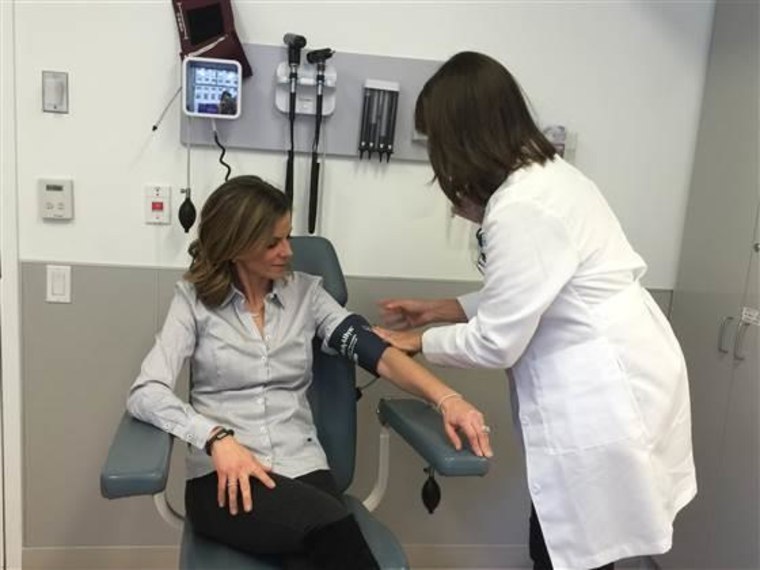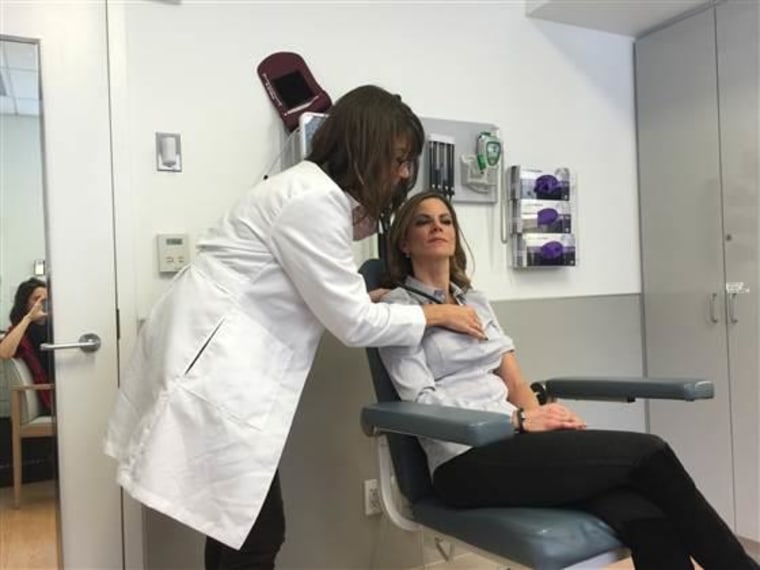When was the last time you had a real heart-to-heart? I just had one today after years of putting it off. I’m not talking about a chat with your spouse or someone you love; rather, a conversation with your doctor about your heart.
Feb. 6 is #GoRedforWomen day in support of heart health awareness. We’ll all be wearing our red dresses, as we do every year, to remind women about what could be a lifesaving issue.
Time and again we are reminded of the statistics: Heart disease is the No. 1 killer of women and the No. 1 killer globally (stroke is No. 2). Heart disease strikes a person in the U.S. once every 43 seconds.
But it was time for me to walk the walk and talk the talk. You see, I — the fitness fanatic and health nut that many of you know me to be — have put off for a long time having an important follow-up test with my doctor.

I do not have heart disease, thankfully. But I know a lot of us (women) don’t really think too much about our risk factors until, sadly, something happens to you or one of your loved ones.
My dad did have a stroke at 51 and high blood pressure. I’m blessed he is now fully recovered and his blood pressure monitored. I know THAT is a genetic risk factor, but beyond that, I don’t smoke, I exercise regularly, I eat healthy (mostly) and I consider myself to be low risk, as does my doctor.
But do you know your risks? Yes, there is now an app for that, too: a risk calculator thanks to the American Heart Association. Have you ever really paid that much attention to your heart?
A few years ago, I was supposed to do a story for TODAY where I was going to take off and land on an aircraft carrier. Flying in a fighter plane is an intense experience and the pressure your body is under in just nanoseconds is tough. Some people black out or throw up.
I had flown with the U.S. Air Force Thunderbirds before and thought, “Nothing to it.” I had hit 9.2 Gs twice and was totally fine. However, this time in order to do the assignment I was supposed to have a complete work up by my doctor, including an EKG.
All was well, but when my doc listened to my heart, he said, “Hmm, there is a slight swooshing sound. Sounds like a murmur.” The EKG confirmed a slight irregularity. Murmurs are not that uncommon and in my case, it’s likely genetic: My dad has one, too.
It’s not related to heart disease, but depending on the degree of murmur, it can affect the heart’s ability to do its job. (Mitral valve prolapse is a condition in which the two valve flaps of the mitral valve do not close properly. Most people never know they have it, but more serious cases can show symptoms of chest pain, dizziness, fatigue, panic attacks, palpitations, and shortness of breath.)
In my case, I do not have any symptoms. The doctor didn’t seem overly concerned and just recommended I get it checked further. However, when it came to being able to do that awesome story I was so looking forward to, well, sadly, I didn’t pass the physical because of that murmur and it was a no go.
I bring this all up because six years later, I have yet to go get that ultrasound I was supposed to get. Finally, with heart health on my mind this month, I decided it was time to get to know my heart a little better.

I met with our NBC Chief Medical Officer, Dr. Tanya Benenson, who gave me a full work up from head to toe, because, as she told me, signs of heart disease and other heart related issues can be spotted in your eyes, your mouth, your neck (carotid artery) even down to your legs and feet (swelling and pulse are important indicators).
After taking my pulse and listening to my heart, I was hooked up to an EKG for another reading. Dr. Tanya (as we all affectionately call her) did confirm a very slight murmur as well and recommended I do a follow-up with a cardiologist for an ultrasound of my heart. She says for someone like me who is low risk, it’s more of a “getting to know you and know what your heart is all about.”
So that’s next and this time, I won’t be waiting six years for another check-up. There’s no time like the present to get to know your heart and your risk factors, so don’t put off what is most important and have that heart to heart.